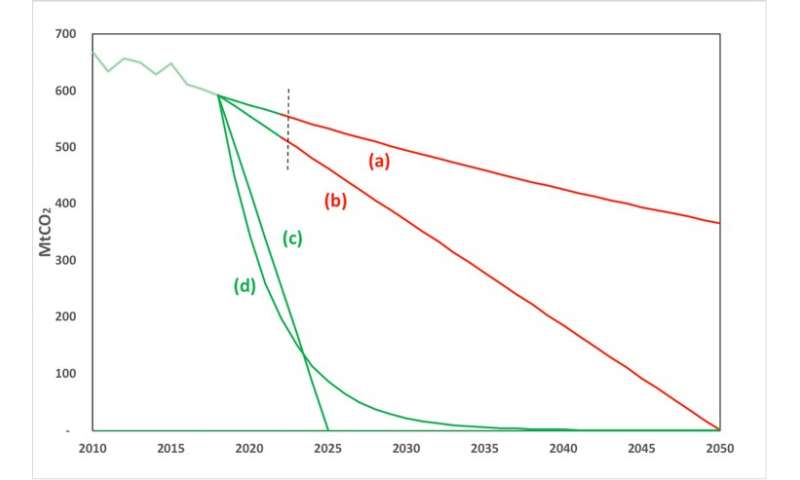Earth to Warm More Quickly, New Climate Models Showhttps://phys.org/news/2019-09-earth-quickly-climate.htmlBy 2100, average temperatures could rise 6.5 to 7.0 degrees Celsius above pre-industrial levels if carbon emissions continue unabated, separate models from two leading research centres in France showed.
...
"With our two models, we see that the scenario known as SSP1 2.6—which normally allows us to stay under 2C—doesn't quite get us there," Olivier Boucher, head of the Institute Pierre Simon Laplace Climate Modelling Centre in Paris, told AFP.
A new generation of 30-odd climate models known collectively as CMIP6—including the two unveiled Tuesday—will underpin the IPCC's next major report in 2021.
A core finding of the new models is that increased levels of CO2 in the atmosphere will warm Earth's surface more easily than earlier calculations had suggested.
If confirmed, this higher "equilibrium climate sensitivity", or ECS, means humanity's carbon budget—our total emissions allowance—is likely to shrink.
... "Higher warming would allow less time to adapt and mean a greater likelihood of passing climate 'tipping points' such as thawing of permafrost, which would further accelerate warming."
The French models are among the first to be released, but others developed independently have come to the same unsettling conclusion, Boucher confirmed.
"The most respected ones—from the United States, and Britain's Met Office—also show a higher ECS" than the previous generation of models, he said.
-----------------------
2050 Is Too Late – We Must Drastically Cut Emissions Much Soonerhttps://phys.org/news/2019-09-late-drastically-emissions-sooner.amp Four UK emissions pathways. (a) is based on our current rate of reduction, and (b) shows that linearly reducing emissions to net zero by 2050 means we’ll exhaust our carbon budget in four years. (c) shows that 2025 is the latest date we could linearly reduce our emissions to net zero, and (d) shows that for a 2050 target to stay within our budget, we’d need a 24% annual reduction in emissions.
Four UK emissions pathways. (a) is based on our current rate of reduction, and (b) shows that linearly reducing emissions to net zero by 2050 means we’ll exhaust our carbon budget in four years. (c) shows that 2025 is the latest date we could linearly reduce our emissions to net zero, and (d) shows that for a 2050 target to stay within our budget, we’d need a 24% annual reduction in emissions.The UK footprint has been falling slowly (at around 1.5% a year) since 2010. But if it continued to fall this slowly, the carbon budget would be exhausted by 2023, in just four years' time (Scenario a).
... What is notable about the 'Scenario c' pathway is that, within little more than a decade, carbon emissions must already have fallen to a very low level. With a 24% annual rate of reduction, UK emissions in 2030 would only be 22m tonnes—less than 5% of the current level of emissions. Only a small programme of negative emissions technologies would be needed to achieve net zero at this point.
Clearly the challenge is still colossal. A 24% reduction in emissions amounts to a cut of 140 million tonnes in the very first year alone. The UK has never achieved anything close to this since its carbon footprint was first measured in 1990. In 2009, when the economy was in recession, the carbon footprint fell by 80m tonnes, while its best post-crisis reduction saw a fall of only 38m tonnes in 2016.
